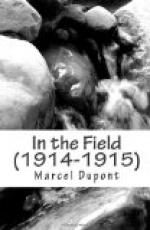For our mess we had the good luck to find a most charming and simple welcome at the house of good Monsieur Cheveret. That kind old gentleman did everything in his power to supply us with all the comforts he could dispose of. And he did it all with such good grace and such a pleasant smile that we felt at ease and at home at once. Madame Cheveret, whom we at once called “Maman Cheveret,” was an alert little old lady who trotted about all day long in quest of things to do for us. She put us up in the dining-room, and helped our cook to clean the vegetables and to superintend the joints and sweets. For Gosset, the bold Chasseur appointed to preside over our mess arrangements, was a professional in the culinary art, and excelled in making everything out of nothing; so, with the help of Maman Cheveret, he accomplished wonders, and the result of it all was that we began to be enervated by the delights of this new Capua. And how thoroughly we enjoyed it!
We shared our Eden with two other squadrons of our regiment, a section of an artillery park, and a divisional ambulance. We prayed Heaven to grant us a long stay in such a haven of repose.
Now one morning, after countless ablutions with hot water and a clean shave, I was going, with brilliantly shining boots, down the steep footpath which led to the little house of our good Monsieur Cheveret, when my attention was drawn to a small white notice posted on the door of the church. It ran:
“THIS
EVENING AT SIX O’CLOCK,
BENEDICTION OF THE MOST HOLY SACRAMENT.”
It occurred to me at once that this happy idea had been conceived by the Chaplain of the Ambulance, for until then the church had been kept locked, as the young parish priest had been called up by the mobilisation. I made haste to tell our Captain and my comrades the good news, and we all determined to be present at the Benediction that evening.
At half-past five our ears were delighted by music such as we had not been accustomed to hear for a very long time. In the deepening twilight some invisible hand was chiming the bells of the little church. How deliciously restful they were after the loud roar of the cannon and the rattle of the machine-guns! Who would have thought that such deep, and also such solemn, notes could come from so small a steeple? It stirred the heart and brought tears to the eyes, like some of Chopin’s music. Those bells seemed to speak to us, they seemed to call us to prayer and preach courage and virtue to us.
At the end of the shady walk I was passing down—whose trees formed a rustling wall on either side—appeared the little church, with its slender steeple. It stood out in clear relief, a dark blue, almost violet silhouette against the purple background made by the setting sun. Some dark human forms were moving about and collecting around the low arched doorway. Perhaps these were the good old women of the district who had come to pray in this little church which had remained closed to them for nearly two months. I fancied I could distinguish them from where I was, dignified and erect in their old-fashioned mantles.




